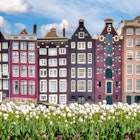

This is never a good time to brew some coffee. Apexphotos / Getty Images
In recent years, Venice has introduced a number of policies to crack down on their overtourism crisis. But May 2018 saw their most stringent set of rules yet come into effect, clamping down on public nuisances like illegal street vendors, loitering and walking around bare-chested in the city centre.
These might seem commonsensical, but a number of fines have already been issued, including one to a pair of German tourists who saw no problem with setting up a portable stove and making themselves a cup of coffee on the steps of the Rialto bridge.
We’re a big fan of anything that prioritises locals and protects ecosystems, but we also understand why some travellers might be looking at these protocols with trepidation. Learn to navigate the new rules with our guide to eight alternative Venetian islands that allow visitors to kick back within the limits of the law.
- placement: fullWidth
- path: articles/in-content-top
- possible size: [970, 250], [970, 90], [728, 90], [300, 250], [320, 50], [1, 1],
- targeting:
{ "url": "navigate-venice-tourism-rules" }

"Don’t affix love locks to bridges or railings"... visit Burano instead
The ‘no Love Locks’ rule won’t be a new one for seasoned travellers; these rust–inducing, amorous tokens have long been banned from many cities after they caused severe structural damage to the iconic Ponts des Arts bridge in Paris. Rather than deface the city, enamour yourself instead with the island of Burano.
Burano is famed for its Bussolai Burani (s-shaped, butter biscuits) and its crayon-coloured streets, the houses painted striking hues of tangerine orange, hot pink and cerulean blue. But its most romantic export has to be its handmade lace, once coveted by aristocracy across the continent. Stop by the Museo del Merletto (Lace Museum) for an intricately-spun history and book in at Merletti d’arte Martina to bag a luxurious, lacey souvenir for your beau.
How to get there: 50-minute vaporetto from Fondamente Nuove, line 12.
Related articles:
How to live like a local in Venice
Alternative destinations to escape the crowds in Western Europe
My experience travelling as a black woman

"No swimming in the canals"... visit Certosa instead
Venice’s canals are working waterways and swimming here is not just poor etiquette, it’s highly dangerous. For an aquatic fix, we recommend Isola della Certosa. Once the site of a grand Carthusian Monastery, these days the island is known for its marina, natural surrounds and watersports.
Here you’ll find the headquarters of Venice Kayak, an amazing little outfit that offers kayaking tours of the canals. Paddle through grand avenues of age-old buildings, deftly navigate tight bends and wedge yourself under impossibly low bridges for a completely new perspective of the city. Plus you’ll earn eco-friendly bonus points for utilising a slow travel, low impact mode of transport.
How to get there: Lines 7, 4.1 and 4.2 go to Certosa from S. Marco (S. Zaccaria).

"Do not walk around in a bikini or bare-chested"... visit Lido instead
This might be the most "#touristproblems" rule we’ve heard yet, but some folks seem to be mistaking this water-adjacent city for a sandy beach. We get you’re in holiday-mode, but spare a thought for the locals having to dodge bare-chested dad bods on their way to work. The answer to this clothing quandary lies on the island of Lido.
- placement: fullWidth
- path: articles/in-content-middle
- possible size: [970, 250], [970, 90], [728, 90], [300, 250], [320, 50], [1, 1],
- targeting:
{ "url": "navigate-venice-tourism-rules" }
This thin sand bar is home to three free public beaches where swimwear is naturally encouraged. Despite the retro feel, modern sustainability initiatives underpin this island which was awarded a Blue Flag eco-accreditation in 2012. The main street is bustling with cute cafes and cocktail bars and bike rentals are available near the vaporetto stop. Visit in late-August or early-September to time your stay with the Venice Film Festival that lands here every year.
How to get there: Take vaporetto lines 1, N, 5.1, 5.2 or 14 from San Marco (S Zaccaria) to Lido.

"Do not buy goods from illegal street vendors"... visit Murano instead
With its dreamy canals and Gothic architecture, Venice exudes an artistic appeal that’s begging to be recreated in magnetised form on your fridge at home. Resist grabbing "any old thing" from the first street vendor you see – real treasure requires a quest. In this case, to the birthplace of the world-renowned Murano glass.
Glass production moved here in the 13th century when some bright spark figured the fire hazard might not mix well with Venice’s warren of wooden houses. Murano glass was so highly coveted that, at the time, it was considered treason for any glass worker to leave the city. Fornace (Furnace) signs along the Fondamenta dei Vetrai mark the island’s prestigious workshops and look out for the "Vetro Murano Artistico" trademark to ensure you’re buying only the best products.
How to get there: 20/30-minute vaporetto from Fondamente Nuove. Take line 12 or 13 to Murano or line 4.1 or 4.2 to Murano Museo.
"Don’t cycle or walk your bicycle in the city centre"... visit San Giorgio Maggiore
Venice is very old, its history dating back to AD 400, so your set of wheels (be they suitcase, skateboard, bicycle or other) could actually be doing serious damage. Preserve the streets by avoiding well-trod areas like Piazza San Marco. Tourists flock here in droves for the Basilica and bell tower, but you can get the next best thing without the crowds on San Giorgia Maggiore.
The island’s Palladian church has long caught the eye of many remarkable painters, including Monet. But beauty aside, its main draw is the 60-metre bell tower. This perch affords unrivalled views across the Piazza San Marco and Doge’s Palace, as well as an iconic shot down the mouth of the Grand Canal.
How to get there: Take line 2 or N from S. Marco (S. Zaccaria) to S. Giorgio.
- placement: native
- path: articles/in-content-native
- possible size: [f, l],
- targeting:
{ "url": "navigate-venice-tourism-rules" }

"Do not stand still on bridges or obstruct storefronts or passageways"... visit Giudecca instead
The Venetian Lagoon takes up an area of around 500 square metres, with some 20 million tourists visiting each year. That’s a hell of a lot of people in one tiny place. Peak months see overcrowding reach dramatic levels, leaving commuting locals stuck behind tour groups for days on end (give or take a day or two). If the crux of Venice’s new rules is instilling a baseline respect for the natives, what better way to show your appreciation than by living like a local during your stay?
Often-overlooked Giudecca is an unconventional, grittier expression of the city. Invest your holiday money back into the community by purchasing your fresh fruit and veg and souvenirs from the women’s prison market, open every Thursday morning. Explore the eclectic Giudecca 795 art gallery and second-guess your instincts at the waterfront diners – ramshackle kiosks conceal some of the most delicious pizza we've ever tasted.
How to get here: From S. Marco (S. Zaccaria), take lines 2, N, 4.1, 4.2 to Zitelle or Redentore.

"No picnicking"... visit Sant’Erasmo instead
Even the most off-the-wall traveller might have a hard time justifying the behaviour of our two German friends hankering after a hot beverage, but they’re not the first to confuse the city streets for a campsite. Those itching to whip out the picnic blanket should head for the market garden island of Sant’Erasmo in the north east of Venice.
Enjoy the scenic walking trails that take you past farms, allotments and plantations, tour the 19th-century ruins and try the island’s iconic export, the famous purple artichoke. If you’re stuck for time, many of the island’s products can be found at the inner-city Rialto Market.
How to get here: Take lines N or 13 from F. Nuove and disembark at Capannone or Forte Massimili.

"Don’t feed the pigeons"... visit Torcello instead
We believe that all animals are equal, but pigeons can be harmful to delicate ecosystems. Not only do they cause sight and sound pollution, but their droppings can actually erode surfaces after time. If it’s nature you’re after, we reckon you can do better than a rabble of greedy pigeons.
Venice’s lagoon is home to several hundred bird species, but the most eye-catching can be found on sleepy Torcello where sheep outnumber the inhabitants. Every winter the waters here blush as huge flocks of flamingos return to feed. Visit around February or March for the best chance of spotting them en mass and keep your cameras primed for the ultimate snap: a group of rose-pink residents cruising over the city skyline.
How to get there: One-hour vaporetto ride from F. Nuove on line N or hop over from neighbouring Burano on line 9.
- placement: fullWidth
- path: articles/bottom
- possible size: [970, 250], [970, 90], [728, 90], [300, 250], [320, 50], [1, 1],
- targeting:
{ "url": "navigate-venice-tourism-rules" }
Explore related stories


 Art and Culture7 of 2024's best TV and movie locations to inspire your travels
Art and Culture7 of 2024's best TV and movie locations to inspire your travelsJul 18, 2024 • 7 min read
 Local VoicesItaly vs Croatia: which Mediterranean country is right for you?
Local VoicesItaly vs Croatia: which Mediterranean country is right for you?Jun 13, 2024 • 8 min read

 Sustainable TravelVenice launches its experimental entry fee today. Here's what visitors need to know
Sustainable TravelVenice launches its experimental entry fee today. Here's what visitors need to knowApr 25, 2024 • 5 min read




